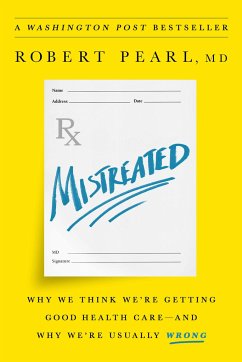"Despite all the debate about health care, Americans tend to assume they are in the best of hands when they enter the hospital. This is inaccurate: American health care is in the bottom half of all industrialized countries. This is only the largest in a broad set of misperceptions. We appropriately worry about the security of technology, but fail to see how its absence kills hundreds of people every day from medical errors. We over-value the impact of intervention on saving lives and ignore the 200,000 people who die each year unnecessarily from diseases they did not have to get. We worry that end of life discussions and palliative care will lead to "death squads," when research proves that people actually live not only better, but also longer. We demand modern information technology from our banks, airlines, retailers and hotels, but we passively accept last century's technology in our health care. It's not just patients who get things wrong. Physicians perceive that the dollars they take from drug companies don't alter their prescribing habits, but the data demonstrates that for every dollar the pharmaceutical world spends on doctors, they get $10 in return. Academic researchers deny that their results are influenced by which company funds the work, but in 95% of the cases, the outcome supports the funding source. Dr. Robert Pearl has seen these mistakes from all sides: as a concerned citizen, a patient, a health industry leader, and most importantly, a victim of bureaucracy, whose own father died due in part to medical error. In this book, Pearl explains why misperception is so common in medicine, both for patients and physicians. Solving the challenges of health care today including excessive costs, poor quality and the lack of convenience will require an understanding of this phenomenon, and an approach that aligns health care delivery with up to date information and data. It emphasizes the power of context, and how through integration, prepayment, information technology and physician leadership, superior outcomes can be achieve. It draws on other industries and companies like Amazon and Uber that were able to overcome customer fear, and shift perception, and provides a roadmap for the future"--
Hinweis: Dieser Artikel kann nur an eine deutsche Lieferadresse ausgeliefert werden.
Hinweis: Dieser Artikel kann nur an eine deutsche Lieferadresse ausgeliefert werden.








